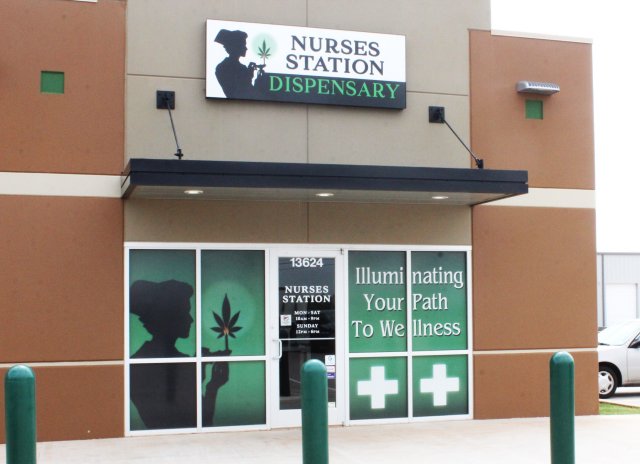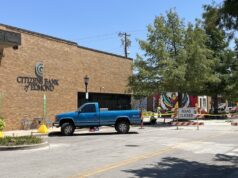

Many Oklahoma cannabis dispensaries are being uprooted from their locations with little warning after Dallas-based 7-Eleven Inc. decided to not renew leases with any medical marijuana businesses.
For decades, 7-Eleven Stores of Oklahoma existed independently of the larger, Dallas-based chain. The Oklahoma company owned more than 100 convenience stores and leased space to neighboring businesses, including about 80 medical marijuana companies.
Earlier this year, however, the Brown family, who owned 7-Eleven Stores of Oklahoma, sold the company to 7-Eleven Inc.
This story was reported by Gaylord News, a Washington reporting project of the Gaylord College of Journalism and Mass Communication at the University of Oklahoma.
Immediately after the change in ownership, businesses leasing retail spaces from 7-Eleven Inc. were assured by the company’s property manager in an email that business would continue as usual. However, this would not remain the case for tenants in the cannabis industry.
“In January, when the initial buyout started taking place, we were all sent emails saying it was probably not going to affect us,” Christian Oliver, owner of Gayle’s Dispensary, in northwest Oklahoma City, said. “It was leading us to believe that most likely nothing is going to change.”
Oliver said he called 7-Eleven Inc.’s Oklahoma property manager Kristi Adams in February to check in and was told she saw no reason for anything to change, as he had been “a perfect tenant.”
‘All decisions were final’
In mid-June, however, medical marijuana dispensaries began hearing their leases would not be renewed. Tenants who signed leases in late 2019, before the buyout, have about a year to move out and find a new location. Other tenants were given a month or a mere few weeks.
Oliver’s lease ended in May and went into a month-to-month leasing arrangement at the start of June. Oklahoma law dictates that, even in a month-to-month agreement, tenants must receive warning one full month before having to vacate the space.
Instead, on June 16, Oliver heard rumors from other dispensary owners that leases were not being renewed. He then heard official word from Adams on June 19 that his dispensary would need to be off the property by the end of the month, Oliver said.
“I asked her if she would initiate some kind of dialogue between us and corporate, and she was very adamant that it wasn’t going to happen,” Oliver said. “She was very adamant they were never going to change their mind and all decisions were final.”
According to Starla Norwood, owner of the Nurses Station dispensary in northwest Oklahoma City, Adams informed her that 7-Eleven would not be continuing leases with any cannabis businesses in Oklahoma.
Neither 7-Eleven Inc. nor Adams could be reached for comment.
Along with Nurses Station and JKJ Processing, a cannabis processor in Yukon, Oklahoma, Oliver sought help from Bethany Law Center attorney Chris Cotner, who bypassed Adams to speak to 7-Eleven Inc. and got the three businesses an extension until the end of September.
“It took me six weeks to secure a lease the first time, so to imagine trying to do that in 10 days is mind boggling,” Oliver said.
According to Cotner, 7-Eleven Inc. also told him that the company had decided not to continue leases with any Oklahoma marijuana companies.
‘They won’t even rent to a dispensary’
Finding a retail spot to rent is more challenging in the cannabis business than in other retail industries.
“Nine times out of ten, whoever you call, they won’t even rent to a dispensary,” Nurses Station manager Jennifer Norwood said. “And the ones that do are charging pretty insane amounts for rent.”
Because medical marijuana is not legal at the federal level, complications can arise if a property owner is leasing space to a dispensary and has a mortgage or loan for the property from a federally insured bank.
Property owners fear being accused of using the property for the federally illegal sale of cannabis and having the loan called by the bank for full and immediate payment.
Even after securing a new retail space, Cotner said the process of reopening in a new location can take three to six months.
“Let’s say all the stars align, and they find a location this afternoon and apply for a change in location. The big roadblock is the certificate of compliance,” Cotner said, referring to the certificate that is needed before receiving a license for a new location.
The owner of JKJ Processing, John Koumbis, said the space he rented from 7-Eleven had been vacant for 12 years before he moved in, and it required three months of work and $10,000 to make it presentable.
“Some of the places we’ve been going around and looking at don’t even have the drywall on the wall yet, others are just in really rough shape,” Oliver, who has been on the hunt for a new location, said.
An uncertain future
Dispensary owners also said they’ve been left confused by 7-Eleven’s decision to cut ties with its tenants.
“I think we bring a lot of business to the 7-Eleven,” Norwood said. “I don’t know why they wouldn’t want to collect our $2,000 every month.”
Oliver speculated it might be that 7-Eleven Inc., a subsidiary of the larger Seven-Eleven Japan Co. Ltd, is politically conservative, and Koumbis described the corporation’s lack of belief in “the goodness of medical marijuana.”
For many of these dispensaries, the challenge of finding a new location and meeting the tax deadline in July makes the future uncertain.
“I’m struggling right now,” Oliver said. “Even the first half of Father’s Day was spent with my kids at home with grandpa, and me and my wife out running around, looking for places. It’s kind of a nightmare.”





















